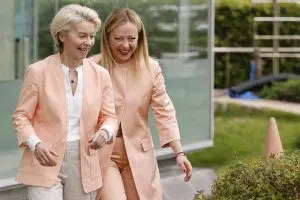Rome – From the stability pact to the national recovery and resilience plan. From the agreement on migration and asylum management to the possible candidacy for European elections in June. The end-of-year traditional press conference organized by the National Council of Journalists in collaboration with the Parliamentary Press Association, which, because of the premier’s health, took place only today (Jan. 4) in Rome, is an opportunity for Giorgia Meloni to talk about Europe and to Europe and try to put out the controversy over the delays in the launch of the Mattei Plan for Africa, which Brussels is also looking at with interest.
“It’s further along than it seems, and from what I hear,” the premier said. Meloni first mentioned the ‘Mattei Plan’ in her speech to the House, calling for a confidence vote for her government in October 2022 as an alternative way of rethinking relations between Africa and Italy and, more generally, between Africa and Europe.
From there on, every (or nearly every) reference by the premier to Italy’s place in Europe comes through this energy and social plan for the continent, named after the former Eni president who died in 1962 and whose “non-predatory” approach to Africa she seeks to imitate at a European level. However, so far no concrete plans have been presented to allow its implemention.
Meloni told reporters, “The paternalistic attitude” by Europe is “that does not help in cooperation with African countries has not worked. There should be no charity to Africa, but serious and strategic cooperation, not a predatory relationship.” Defending, “First of all, the right not to emigrate before the right to be able to emigrate,” Meloni said.
According to the government, through an investment and training plan for Africa, it is possible to improve relations with Europe not only concerning the issue of the supply of energy resources that are scarce in Europe but also to improve the joint management of migratory flows, which have to be solved upstream and not downstream, talking only about the issue of redistribution once migrants set foot in the EU.
Meloni refers to the recent political agreement in Brussels on the pact on migration and asylum, after years of political stalemate. A good compromise, according to the premier, but one that does not overcome the hard core of the Dublin Treaty (as Italy wanted), that is, the principle of the ‘country of first entry,’ which binds refugees to identify themselves and remain in the first PEU country they set foot in. This is why ensuring the “right not to leave” is a priority for Meloi and this comes through on-site investments. “My goal is that it becomes a model for other countries that can join later,” she added.

However, the Mattei Plan is also, and more importantly, an energy issue, and a way to create a strategy, a bridge between Africa and Europe, in which Italy, given its geographical location, could be an important hub. The Dark Continent is rich with energy resources and critical materials for the twin transition, while the Old Continent has a supply problem. The real point of the Africa strategy sought by Meloni (but on which Brussels is also working on with the Global Gateway funding strategy) is to “get” to Africa before someone else gets there, e.g., China.
Despite the premier’s reassurances to reporters, a de facto delay in the launch of the Plan is an objective fact. The details were due as early as last October, but there has been nothing yet, and Meloni, at the press conference, was careful not to give any information on the projects that will make the plan concrete. Meloni promised, however, that the plan would be presented in detail at the “Italy-Africa conference in a few weeks, and then she will talk about it in Parliament.” Relations with Africa, the premier again assured, will be the focus of the Italian presidency of the G7 (the informal intergovernmental group that brings together the top seven economies of advanced countries: Canada, France, Germany, Japan, Italy, the United Kingdom, and the United States) that just started. “Clearly, we cannot take care of Africa alone,” the premier added, assuring that the issue will be central during the presidency, but it must also be central in Brussels.
English version by the Translation Service of Withub




